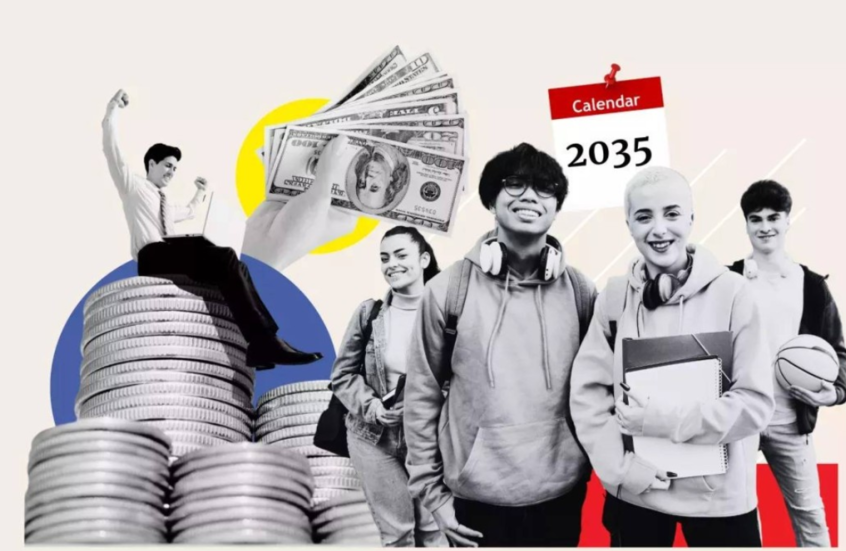A recent study highlights that Generation Z is on track to emerge as the wealthiest generation by approximately 2035. Despite the mounting financial pressures from rising education costs and housing expenses, coupled with elevated unemployment rates, Gen Z continues to prioritize spending on themselves and their pets. This generation often chooses pet ownership over having children, primarily due to the significantly higher costs associated with raising children. Although they may be practicing financial restraint currently, they are laying the groundwork to become a formidable economic force in the future.
According to a report from Bank of America, Gen Z is expected to generate over $74 trillion in income by 2040, with their contribution to the global economy projected to reach 30% within the next decade. Impressively, just two years ago, this generation amassed $9 trillion, and by 2030, they are projected to hit $36 trillion.
So, what factors are contributing to this anticipated wealth? The report identifies two primary drivers: wage growth and the phenomenon known as the "Great Wealth Transfer." This indicates that Gen Z is not merely a fleeting trend; they are poised to become a significant economic powerhouse. The report suggests, “In approximately five years, Gen Z will have collectively earned $36 trillion, with that number expected to escalate to $74 trillion by around 2040. In 2023, their total stood at only $9 trillion.” The study also notes that Gen Z will redefine consumerism in the U.S., influenced by shifts in dietary preferences, reduced alcohol consumption, and evolving saving and housing habits.
In addition to their economic potential, Generation Z is on track to become the most educated generation yet. As of 2022, the Pew Research Center reported that 57% of Gen Z members were enrolled in two-year or four-year colleges, a significant increase compared to the 52% of millennials in 2003 and 43% of Generation X in 1987.
However, this generation grapples with the challenge of underemployment. Bank of America analyzed its deposit data and found that the number of Gen Z individuals receiving unemployment benefits rose by 32% year-over-year in the previous month. While this increase is notable, it is less dramatic than the upticks observed in older generations. Following the economic disruptions caused by COVID-19, Gen Z is now contending with a labor market that presents significant challenges. The report notes that the unemployment rate among new entrants to the job market—predominantly Gen Z—rose by 9% year-over-year in February, continuing an upward trend since 2023.
Describing Gen Z as "overeducated and underemployed," the report reveals that 57% of individuals aged 18 to 21 who had left high school were enrolled in higher education in 2022. This demographic is already leading global spending trends, with an anticipated $2.7 trillion in expenditures in 2024. By 2030, their spending is expected to soar to $12.6 trillion, fueled by discretionary spending and rising household costs. This generation appears ready to make substantial economic contributions, indicating they are prepared to unleash their purchasing power.
Businesses are increasingly adapting to Gen Z’s preferences, focusing their efforts on sectors such as luxury goods, beauty products, technology, wellness, and pet care, along with e-commerce. As Gen Z accumulates wealth, they are likely to redefine economic dynamics and alter consumer shopping behaviors. This generation is poised to set the standards for future spending, fundamentally transforming the marketplace.
Gen Z's spending power is already influencing various industries. Known for their affinity for luxury items, technology, wellness products, and pet ownership, businesses are eager to meet the demands of this demographic. Companies like Shein, Glossier, and TikTok are responding to Gen Z’s desire for affordable fashion, personalized beauty experiences, and interactive social media platforms. Additionally, Gen Z is propelling the growth of e-commerce through platforms like Depop and Chewy, revolutionizing shopping practices. Their purchasing choices extend beyond mere trends; they are reshaping entire industries and paving the way for a future dictated by their spending habits.
Zainab Y.
Also on site :
- Type 1 diabetes and latent autoimmune diabetes: Role of early detection, awareness and advanced medical support
- L'innovation de Raytron en matière d'imagerie thermique à infrarouge aide les scientifiques à surveiller la biodiversité comme jamais auparavant
- La innovación de Raytron ayuda a los científicos a rastrear la biodiversidad como nunca antes

